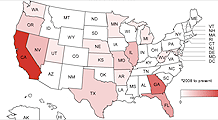Bank failure tally reaches 130
Regulators shutter Cleveland-based AmTrust Bank, and five other banks. Closures will cost the FDIC $2.384 billion.
NEW YORK (CNNMoney.com) -- The nation's tally of 2009 bank casualties hit 130 Friday when regulators shuttered a large Ohio bank, an Illinois bank, a Virginia bank and three small Georgia banks.
The largest bank to fail was AmTrust Bank in Cleveland.
Regulators also closed Benchmark Bank in Aurora, Ill., and Greater Atlantic Bank in Reston, Va.
The Buckhead Community Bank in Atlanta, Ga., First Security National Bank in Norcross, Ga., The Tattnall Bank in Reidsville, Ga., were also closed.
Customers of all the six failed banks are protected, however. The Federal Deposit Insurance Corp., which has insured bank deposits since the Great Depression, currently covers customer accounts up to $250,000.
AmTrust Bank. The Office of Thrift Supervision closed AmTrust Bank because it "was in an unsafe and unsound condition because of substantial loan losses, deteriorating asset quality, and insufficient capital."
The agency said the failed bank's core capital declined 68% in the 12-month period ending Sept. 30, and a high level of AmTrust's asset problems were due to residential and land acquisition, development, and construction lending in Florida, California, Arizona and Nevada.
AmTrust operated under the agency's approved risk reduction plan since the start of 2009, but the bank was unable to comply with the minimum capital requirements, the OTS said.
The agency said attempts to find an investor to recapitalize the bank, which was first established in 1889 as The Ohio Savings and Loan Company, were unsuccessful.
New York Community Bank in Westbury, N.Y., will assume AmTrust Bank's $8 billion in deposits and purchase $9 billion of the failed bank's $12 billion in assets, according to the FDIC.
The 66 branches of AmTrust Bank located throughout Ohio, Florida and Arizona employ 1,728 workers and will reopen as branches of New York Community Bank.
Benchmark Bank. MB Financial Bank, National Association, in Chicago will assume Benchmark Bank's $181 million in deposits and will purchase "essentially all" of the bank's $170 million in assets, according to the FDIC. MB Financial Bank, National Association entered into a loss-share agreement with the FDIC on $139 million of the failed bank's assets.
The five branches of Benchmark Bank will reopen as branches of MB Financail Bank, National Association.
Greater Atlantic Bank. Sonabank in McLean, Va., will assume Greater Atlantic Bank's $179 million in deposits, and will purchase "essentially all" of the bank's $203 million in assets, the FDIC said. Sonabank entered a loss-share agreement with the FDIC on $145 million of the failed bank's assets.
The four branches of Greater Atlantic Bank will reopen as branches of Sonabank.
Georgia banks. State Bank and Trust Company in Macon, Ga., will assume The Buckhead Community Bank's $838 million in deposits and purchase "essentially all" of the bank's $874 million in assets, according to the FDIC. State Bank and Trust Company also entered into a loss-share agreement with the FDIC on $692 million of the failed bank's assets.
The Buckhead Community Bank will reopen as State Bank and Trust Company, as will its six branches in Georgia operating under the following names: The Sandy Springs Community Bank, The Midtown Community Bank, The Alpharetta Community Bank, the Cobb Community Bank, The Forsyth Community Bank and The Hall Community Bank.
State Bank and Trust Company will also assume First Security National Bank's $123 million in deposits, according to the FDIC, and purchase approximate $118 million of the failed bank's $128 million in assets, the FDIC said. State Bank and Trust Company also entered into a loss-share agreement with the FDIC on $82.4 million of First Security National Bank's assets.
The four branches of First Security National Bank will reopen as branches of State Bank and Trust Company.
HeritageBank of the South in Albany, Ga., will assume The Tattnall Bank's $47.3 million in deposits and purchase $48.5 million of the failed bank's $49.6 million in assets.
The two branches of The Tattnall Bank will reopen as branches of HeritageBank of the South.
Customers of the failed banks can access their money over the weekend by writing checks or using ATMs or debit cards. Checks will continue to be processed, and borrowers should make mortgage and loan payments as usual.
The FDIC also said customers should continue to use their existing branch until they receive notice that the takeover has been completed.
FDIC's fund. An average of 11 banks have failed per month this year, and the federal agency's deposit insurance fund has slipped into the red for the first time since 1991.
At the end of the quarter on Sept. 30, the value of the fund was $8.2 billion in the hole, but the figure includes $21.7 billion the agency has accounted for future bank failures. Friday's closures will cost the FDIC an estimated $2.384 billion.
After recently approving a measure for banks to repay their insurance premiums over the next three years, however, the FDIC expects to raise $45 billion. The move expects to send the fund back in black in 2012.
The bank failure count for 2009 is still far from 1989's record high of 534 bank closures which took place during the savings and loan crisis, when the insurance fund also carried a negative balance.
The tally is nearly five times the number that failed in 2008, and the highest tally since 1992 when 181 banks failed.
Last week, the FDIC announced that 552 banks are at risk of going under, the highest level since 1993, when the agency had red-flagged 575 banks.
But history has shown just 13% of the so-called "problem" banks have failed on average. ![]()



